12--Alice Walker, Everyday Use
- 格式:doc
- 大小:55.50 KB
- 文档页数:7
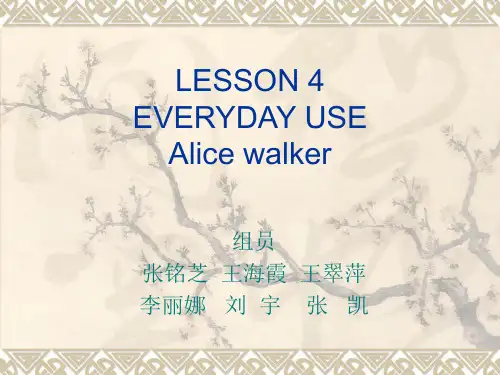
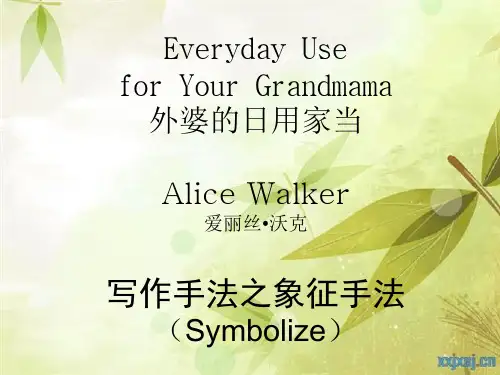
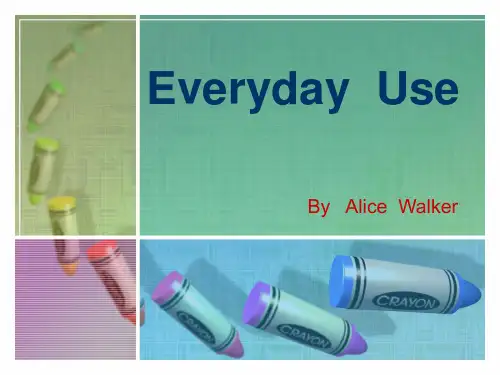
By Alice WalkerAlice Walker February 9, 1944-General introduction •novelist, poet, essayist, educator.•biographer, editor, short-story writer.•activist on environmental, feminist and womanist causes, issues of economic justice.Biographical IntroductionAlice Walker was born in 1944 in Georgia, the eighth and youngest child to a poor sharecropper family. When she was eight years old, she was blinded in her right eye while playing with her brothers.After graduating from high school in 1961, she studied first at Spelman college in Atlanta and then at Sarah Lawrence in New York.•Upon graduation from Sarah Lawrence in 1965 she took part in the Civil Rights movement. From 1976 on, she has been teaching creative writing and black studies at Jackson State College, Tougaloo College, Wellesley College, University of Massachusetts. And she currently resides in Northern California.1. rape2. violence3. isolation4. troubled relationships5. multi-generationalperspectives(多代的角度)6. sexism and racismMajor works 1965-“To Hell With Dying” (short stories)(地狱和死亡)1973-In Love and Trouble: Stories of Black Women( a collection short stories)1976-Meridian《子午线》(novel)1982-The Color Purple(novel)(紫色)1989-The Temple of My Familiar(novel)(我熟悉的殿)1998-By the Light of My Father…s Eyes (novel)(父亲的微笑之光)The Color PurpleThe ColorPurpleThe Pulitzer PrizeTheNationalBookAwadTheNationalBookCriticsCircle12/4/2013Taking place mostly in rural Georgia,the story focuses on female black life during the 1930s in the Southern United States, addressing the numerous issues including their exceedingly low position in American social culture. The novel has been the frequent target of censors and appears on the American Library Association list of the 100 Most Frequently Challenged Books of 2000-2009 at number seventeen because of the sometimes explicit content, particularly in terms of violence.The History and Culture of the African-AmericanImpact : MeaningfulA black woman---RosaParksClimax : Martin LutherKingCause :Unequal state Time :1955-1968Form : Non-violent The Civil Rights MovementThe third Negro RenaissanceSituation not changed The late 1960s tothe early 1970sBlack Power Ideologiesand Black AestheticCause Time ThemeCulture 1.music•blues•jazz•hip-hop(rap、b-boying、dj、graffiti writing、beat-box)2.sports•land surfing3.literature•Alexander Murray Palmer Haley--Roots: The Saga of an American Family•Toni Morrison--The Bluest Eye•Ralph Waldo Ellison--Invisible ManWedding customs•跳扫帚(在美国的黑奴时代, 黑人男女是不允许正式结婚生活在一起的。
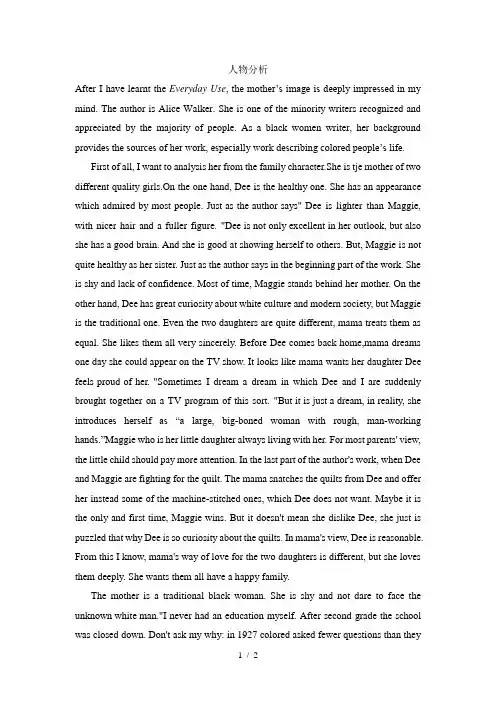
人物分析After I have learnt the Everyday Use, the mother’s image is deeply impressed in my mind. The author is Alice Walker. She is one of the minority writers recognized and appreciated by the majority of people. As a black women writer, her background provi des the sources of her work, especially work describing colored people’s life.First of all, I want to analysis her from the family character.She is tje mother of two different quality girls.On the one hand, Dee is the healthy one. She has an appearance which admired by most people. Just as the author says" Dee is lighter than Maggie, with nicer hair and a fuller figure. "Dee is not only excellent in her outlook, but also she has a good brain. And she is good at showing herself to others. But, Maggie is not quite healthy as her sister. Just as the author says in the beginning part of the work. She is shy and lack of confidence. Most of time, Maggie stands behind her mother. On the other hand, Dee has great curiosity about white culture and modern society, but Maggie is the traditional one. Even the two daughters are quite different, mama treats them as equal. She likes them all very sincerely. Before Dee comes back home,mama dreams one day she could appear on the TV show. It looks like mama wants her daughter Dee feels proud of her. "Sometimes I dream a dream in which Dee and I are suddenly brought together on a TV program of this sort. "But it is just a dream, in reality, she introduces herself as “a large, big-boned woman with rough, man-working hands.”Maggie who is her little daughter always living with her. For most parents' view, the little child should pay more attention. In the last part of the author's work, when Dee and Maggie are fighting for the quilt. The mama snatches the quilts from Dee and offer her instead some of the machine-stitched ones, which Dee does not want. Maybe it is the only and first time, Maggie wins. But it doesn't mean she dislike Dee, she just is puzzled that why Dee is so curiosity about the quilts. In mama's view, Dee is reasonable. From this I know, mama's way of love for the two daughters is different, but she loves them deeply. She wants them all have a happy family.The mother is a traditional black woman. She is shy and not dare to face the unknown white man."I never had an education myself. After second grade the school was closed down. Don't ask my why: in 1927 colored asked fewer questions than theydo now."Mama never has an education herself. In her words, she indicates that the black people's right has been seriously invaded. " I used to love to milk till I was hooked in the side in '49. Cows are soothing and slow and don't bother you, unless you try to milk them the wrong way."Mama's rib is been hurt very harm. But she thinks it is not the cow's fault, it's because her way of milking. She is quite kind and reasonable. "When she comes I will meet—but there they are!" Mama is so surprised and delighted to see her daughter Dee comes back home. After Dee is at home, she told mama, "Not Dee,Wangero Leewani Ka Kemanjo! "At first, I think the mama must be angry for the girl changed her name by herself. But to my astonishment, mama trys her best to call the new name. She just tells to her daughter, "Why shouldn't I? " She asked."If that's what you want us to call you,we'll call you."After I read this, I know she is a brilliant mother. She could accept Dee to use her new name Wangero, which has no “bad” history. As we all know that Dee is the symbol of the new culture. All these actions show us that she is a little bit like the white culture, or somehow, she is curious about it. From all this, we can get that the Mama in the fiction is a black woman who is protecting the Black Culture and the true meaning of black art. In Maggie and Mama’s opinion, the things which they are using everyday is the black art, and the true meaning of black art is not to show, but to use everyday use everyday.。
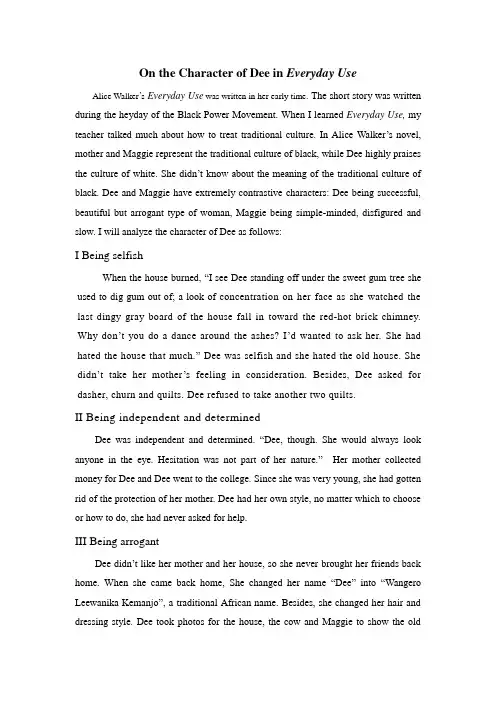
On the Character of Dee in Everyday Use Alice Walker’s Everyday Use was written in her early time. The short story was written during the heyday of the Black Power Movement. When I learned Everyday Use, my teacher talked much about how to treat traditional culture. In Alice Walker’s novel, mother and Maggie represent the traditional culture of black, while Dee highly praises the culture of white. She didn’t know about the meaning of the traditional culture of black. Dee and Maggie have extremely contrastive characters: Dee being successful, beautiful but arrogant type of woman, Maggie being simple-minded, disfigured and slow. I will analyze the character of Dee as follows:I Being selfishWhen the house burned, “I see Dee standing off under the sweet gum tree she used to dig gum out of; a look of concentration on her face as she watched the last dingy gray board of the house fall in toward the red-hot brick chimney. Why don’t you do a dance around the ashes? I’d wanted to ask her. She had hated the house that much.” Dee was selfish and she hated the old house. She didn’t take her mother’s feeling in consideration. Besides, Dee asked for dasher, churn and quilts. Dee refused to take another two quilts.II Being independent and determinedDee was independent and determined. “Dee, though. She would always look anyone in the eye. Hesitation was not part of her nature.”Her mother collected money for Dee and Dee went to the college. Since she was very young, she had gotten rid of the protection of her mother. Dee had her own style, no matter which to choose or how to do, she had never asked for help.III Being arrogantDee didn’t like her mother and her house, so she never brought her friends back home. When she came back home, She changed her name “Dee”into “Wangero Leewanika Kemanjo”, a traditional African name. Besides, she changed her hair and dressing style. Dee took photos for the house, the cow and Maggie to show the oldfashion off to her friends. But now it was different, Dee not only took photos, but also took her boyfriend back home. Compared with her former attitude towards everyday use, Dee showed tremendous cherish. She walked around the house to seek anything that had long history.In the past, the mother wanted to give the quilts to her elder daughter Dee. But Dee rejected them as too old-fashioned and out of style. Therefore the mother promised the quilts to her younger daughter Maggie. Now Dee asks her mother for the quilts and some more pieces of their family heritage because she now regards them as part of her cultural heritage, which she intends to hang on the wall. She wanted to show that she knew about African culture. So she was arrogant.In the end, against the expectation of Dee, the mother refused her wish and gave the quilts to Maggie, who would have agreed to give the quilts to her sister. Dee left without a piece of her family heritage, with her mother being satisfied with their simple southern life and with her sister Maggie, who would put the quilts to everyday use.From this novel, we should learn to have a right attitude to our culture and know the real meaning.。
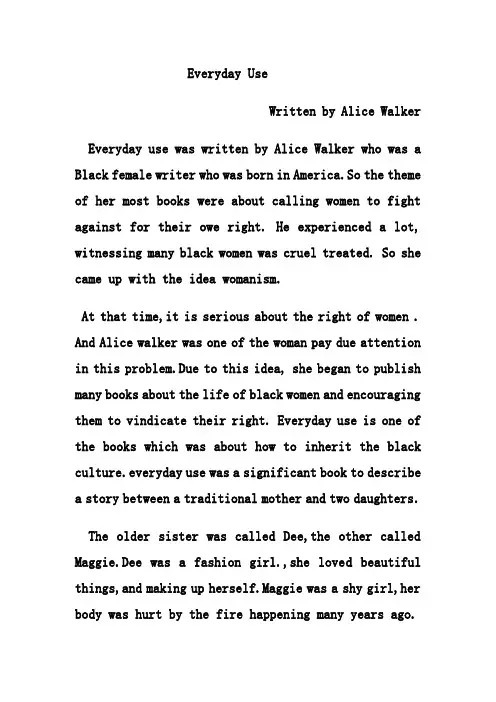
Everyday UseWritten by Alice Walker Everyday use was written by Alice Walker who was a Black female writer who was born in America.So the theme of her most books were about calling women to fight against for their owe right. He experienced a lot, witnessing many black women was cruel treated. So she came up with the idea womanism.At that time,it is serious about the right of women . And Alice walker was one of the woman pay due attention in this problem.Due to this idea, she began to publish many books about the life of black women and encouraging them to vindicate their right. Everyday use is one of the books which was about how to inherit the black culture.everyday use was a significant book to describe a story between a traditional mother and two daughters. The older sister was called Dee,the other called Maggie.Dee was a fashion girl.,she loved beautiful things,and making up herself.Maggie was a shy girl,her body was hurt by the fire happening many years ago.One day, Dee came home to handle the generations. There was a confliction between them. When her mother saw this,she did a thing no one thought, her mother grabbed the quilts from Dee ,and put them to Maggie’s knee. She thought Maggie was a shy , dull and unattractive girl she was too shy to try for her own. She felt ashamed of her ugliness, so she always hid herself.she want to show her respect to the heritage. However, she wanted it for the wrong reason, saying that she would use it only for decoration. when they had dinner Dee want butter churn, because she knew this is her uncle carved it from a tree.Dee was very "educated, worldly, and deeply determined"; She didn't let anything get in the way of getting what she wants. Meanwhile,she was a selfish girl.The two daughter had different characters. The story surrounded quilts happened. Even that Maggie did not fight for her beneficiary. She put up with it, and gave the quilts to her sister. When they discussed how to assign the heritage,Dee expressed actively what shewanted, while Maggie did not.Another example was when she wanted the quilts that Mama had. She stated that she wanted them because of the generations of clothing and effort put into making the quilt, showing her appreciation for her heritage. There are three main roles in the story, Dee, Maggie and mama. Mama narrated the characteristic of her two daughters. In the story,mama was a traditional black woman, Maggie lived with her. She knew her two daughters a lot.Maggie was an innocent girl, she was ashamed of her ugly. while her appearance did not defeat her, she was grateful. she was so modest.the story was surrounded by how to inherit their grandma's stuff.the story seemed so simple, but it had great significance to us. Even the two daughters are quite different, mama treated them as equal. She liked them. when the two daughters were fighting for the quilts, The mama snatched the quilts from Dee. because she knew that Dee did not really want the quilts but to show them.Dee was so willful that she thought everyone should satisfy her. she paid little patient on others. she only knew what she needed and what benefited for her.After having read this story,we can know easily that mama was a traditional black woman, she had little education.while she had a daughter,Dee.she had high education.she was so proud of her daughter.However when Dee came home with a white man. she was afraid and not dare to face the unknown while man.what's more, when Dee asked mama not to ask her "Dee",but "Orangery". mama didn't rebut her but accept her new name. Obviously, mama knew that Dee wanted to put away her figure as a black. Dee was the symbol of the new culture, she knew much but she want to abandon her status.On the contrary, Maggie stood for the black culture, she was pavid and always stood behind her mother. She admired her sister but not overcome her coward.when fighting for the quilts,she accepted the machine-stitched ones, which Dee does not want.Though Maggie was younger than her sister, while sheknew concession. The quilts were not only the quiltsbut standing for the black culture. From all this, wecan get that the Mama in the fiction is a black womanwho is protecting the Black Culture and the true meaningof black art.Dee thought highly of outward of the inheritance. Shedid not really want to inherit,but to show.The author'spurpose was to tell us to value the essential of theculture, to make much of the practical valuable. thoughinherit the culture, should we use it everyday.In our daily life, we should always remind of ourselves.Don't be puzzle by what you see but by what you believe."seeing is believing" is not always right. Everything youcan not see the surface, but the inner. As the story, n otto show it everyday, but to use it everyday.郑真真英语一班2013170029。
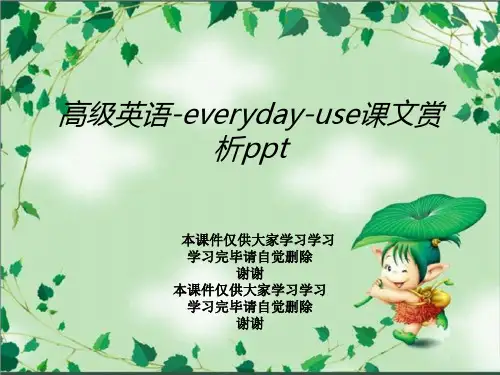
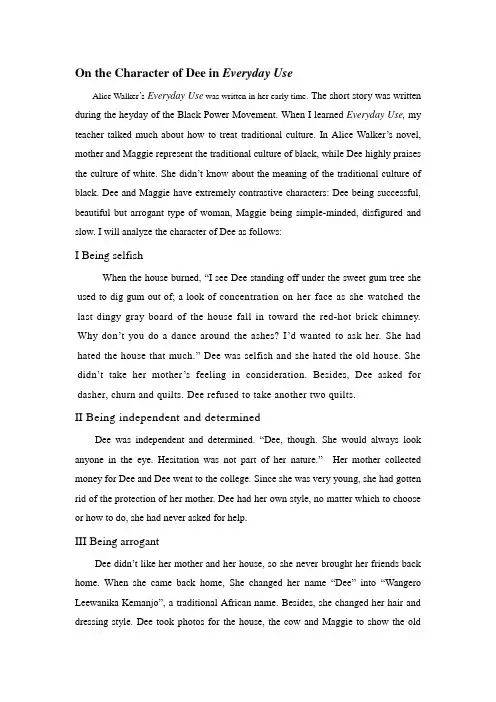
On the Character of Dee in Everyday UseAlice Walker’s Everyday Use was written in her early time. The short story was written during the heyday of the Black Power Movement. When I learned Everyday Use, my teacher talked much about how to treat traditional culture. In Alice Walker’s novel, mother and Maggie represent the traditional culture of black, while Dee highly praises the culture of white. She didn’t know about the meaning of the traditional culture of black. Dee and Maggie have extremely contrastive characters: Dee being successful, beautiful but arrogant type of woman, Maggie being simple-minded, disfigured and slow. I will analyze the character of Dee as follows:I Being selfishWhen the house burned, “I see Dee standing off under the sweet gum tree she used to dig gum out of; a look of concentration on her face as she watched the last dingy gray board of the house fall in toward the red-hot brick chimney. Why don’t you do a dance around the ashes? I’d wanted to ask her. She had hated the house that much.” Dee was selfish and she hated the old house. She didn’t take her mother’s feeling in consideration. Besides, Dee asked for dasher, churn and quilts. Dee refused to take another two quilts.II Being independent and determinedDee was independent and determined. “Dee, though. She would always look anyone in the eye. Hesitation was not part of her nature.”Her mother collected money for Dee and Dee went to the college. Since she was very young, she had gotten rid of the protection of her mother. Dee had her own style, no matter which to choose or how to do, she had never asked for help.III Being arrogantDee didn’t like her mother and her house, so she never brought her friends back home. When she came back home, She changed her name “Dee”into “Wangero Leewanika Kemanjo”, a traditional African name. Besides, she changed her hair and dressing style. Dee took photos for the house, the cow and Maggie to show the oldfashion off to her friends. But now it was different, Dee not only took photos, but also took her boyfriend back home. Compared with her former attitude towards everyday use, Dee showed tremendous cherish. She walked around the house to seek anything that had long history.In the past, the mother wanted to give the quilts to her elder daughter Dee. But Dee rejected them as too old-fashioned and out of style. Therefore the mother promised the quilts to her younger daughter Maggie. Now Dee asks her mother for the quilts and some more pieces of their family heritage because she now regards them as part of her cultural heritage, which she intends to hang on the wall. She wanted to show that she knew about African culture. So she was arrogant.In the end, against the expectation of Dee, the mother refused her wish and gave the quilts to Maggie, who would have agreed to give the quilts to her sister. Dee left without a piece of her family heritage, with her mother being satisfied with their simple southern life and with her sister Maggie, who would put the quilts to everyday use.。

E v e r y d a y U s e人物分析(总3页) -CAL-FENGHAI.-(YICAI)-Company One1-CAL-本页仅作为文档封面,使用请直接删除Character Analysis of the Everyday Use王鹤澎英语12012014/10/25Character Analysis of the Everyday UseTony WangAlice Walker, the splendid writer who main focused at American Women literature and black literature, wrote the Everyday Use at the beginning of the twentieth century. As one of the most famous short story of Alice Walker, Everyday Use represent the conflicts of three black women. And this story became classic work in American literature because of its profound ideological level and perfect artistic quality.There are three main character in the story. The Mama, a laborious woman; Dee, eldest daughter of Mama, who is beautiful, smart and well-educated; Maggie, in contrast with her sister, who is ugly, cowardice and self-abased. The writer used symbolize, metaphor and others rhetorical devices express the different attitudes of Negros when their culture was impact by a stronger one.Dee is the symbol of Black Culture Nationalism Activity. In the 1960s, some African-American started the Black Culture Nationalism Activity, which aimed at deny the unfair culture position and find Negro’s native culture. In the colonialist culture blacks become inferior nation, so Dee want to change this situation. She thought she love the everyday use of her family, changed her name which she thought was white imposed to her, worn the native clothes (in her mind) of black. However, she still cannot find her position in her mind. In fact, Dee was the woman who wandered between the first world and the third world. She want to enter the main world with her dignity and honor of Negros, but fell into the marsh of confuse. Faced with westerners, she cannot say a word or in accordance with her native culture. In the other hand, faced with her family, she had superiority complex strangely. Because she abandoned one important part of her native culture stage –Negros’ humiliating history. She was not grieved when the house, which was full of he r family’s suffering, burned into ash; she ignore the feeling of her younger sister Maggie, the symbol of African-American’s suffering; she even want to rap the qui lts which is the only thing Mama gave to Maggie. She thought she was finding the root of African culture, but what she did was deviate from her original intention. At all, Dee is only a perplexed woman infected by crowd mentality. She didn’t know that the right attitude to culture heritage is use it as everyday use and renew it continually.Poor Maggie is the youngest daughter of this complicated family. It seemed that all the pains were concentrated into her body. She endured three different kind of pain. The first is the pain caused by slavery system. The Mama used this kind of sentence to describe Maggie - “Have you ever seen a lame animal, perhaps a dog run over some careless person rich enough to own a car, sidle up to someone who is ignorant enough to be kind of him”. The rich man is the representation of white. Mama‘s meaning is that the sca rs of Maggie were given by white, in other word, slavery system. The second pain is the ignorance and deny of Black Culture Nationalism Activity. The reader of Everyday Use can easily attracted by the big difference between Dee and Maggie. This difference can make readers realized theconflict of blacks’ nowadays wander and the heavy history. Some radical black nationalists feel shame because of the exist of “Maggies”, they want hide this history stage totally. This irresponsible action is no other than the murder of African-Americans’ native culture. The third pain was caused by Mama’s intentional dodge. Mama is one of the most classic Negro women, also the representation of common black people. This kind of dodge can be realized as the dodge of common black people to their suffering history. But at the end of story Mama still insisted to give the quit to Maggie. This can indicate that the common blacks still stand at the right position when they facing their culture. This is the choice of Mama, also Alice Walker.Mama is the most complex character in this short story. To Dee, she was pound of her ability and appearance. Mama wandered Dee can give herself and her family a better life. But she was disappointed by Dee’s performances. This also means that the common were disappointed by Black Culture Nationalism Activity. Mama did a lot effort to know De e’s new life. But when Dee wanted to rap the everyday use of her family to find so-called native culture, Mama was totally despair. To Maggie, Mama’s inchoative a ttitude was dodge and ignore intent deliberately. When Maggie said that “How I look, Mama” Mama just said “Come out into the yard. ”and diverge the talk. Because Mama was helpless when she faced Maggie, just as black common were helpless when talking about the suffering history. At last, one sentence of Maggie disenchant Mama. “I can member Grandma Dee without the quilts.” This words shocked Mama deeply, let her knew who was the best heir of the quilts and the whole family. And this behavior also means that the black common found their sense of culture belonging at last – only the people who can afford the whole history of blacks can be the heirs of the black culture.Alice Walker gave different symbol to these character. Just as one old saying in China, true gold will find its price. Alice Walker leaded black public face up to their true culture, criticized the error occurred when black nationalists looking forward to their native culture root. She gave this activity a new beginning.。
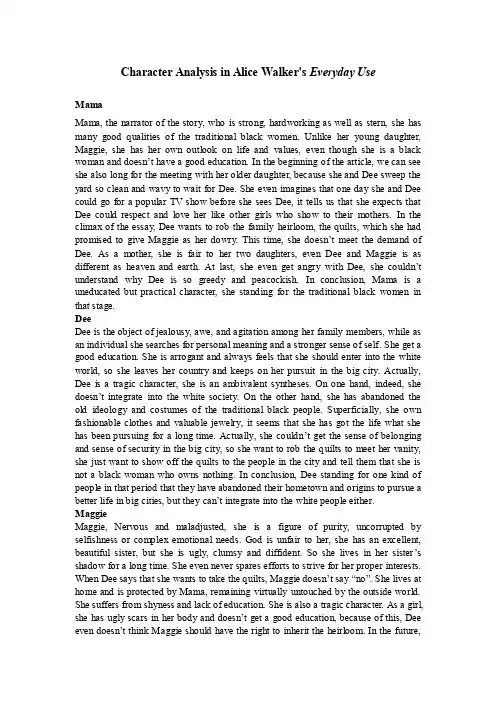
Character Analysis in Alice Walker's Everyday UseMamaMama, the narrator of the story, who is strong, hardworking as well as stern, she has many good qualities of the traditional black women. Unlike her young daughter, Maggie, she has her own outlook on life and values, even though she is a black woman and doesn’t have a good education. In the beginning of the article, we can see she also long for the meeting with her older daughter, because she and Dee sweep the yard so clean and wavy to wait for Dee. She even imagines that one day she and Dee could go for a popular TV show before she sees Dee, it tells us that she expects that Dee could respect and love her like other girls who show to their mothers. In the climax of the essay, Dee wants to rob the family heirloom, the quilts, which she had promised to give Maggie as her dowry. This time, she doesn’t meet the demand of Dee. As a mother, she is fair to her two daughters, even Dee and Maggie is as different as heaven and earth. At last, she even get angry with Dee, she couldn’t understand why Dee is so greedy and peacockish. In conclusion, Mama is a uneducated but practical character, she standing for the traditional black women in that stage.DeeDee is the object of jealousy, awe, and agitation among her family members, while as an individual she searches for personal meaning and a stronger sense of self. She get a good education. She is arrogant and always feels that she should enter into the white world, so she leaves her country and keeps on her pursuit in the big city. Actually, Dee is a tragic character, she is an ambivalent syntheses. On one hand, indeed, she doesn’t integrate into the white society. On the other hand, she has abandoned the old ideology and costumes of the traditional black people. Superficially, she own fashionable clothes and valuable jewelry, it seems that she has got the life what she has been pursuing for a long time. Actually, she couldn’t get the sense of belonging and sense of security in the big city, so she want to rob the quilts to meet her vanity, she just want to show off the quilts to the people in the city and tell them that she is not a black woman who owns nothing. In conclusion, Dee standing for one kind of people in that period that they have abandoned their hometown and origins to pursue a better life in big cities, but they can’t integrate into the white people either.MaggieMaggie, Nervous and maladjusted, she is a figure of purity, uncorrupted by selfishness or complex emotional needs. God is unfair to her, she has an excellent, beautiful sister, but she is ugly, clumsy and diffident. So she lives in her sister’s shadow for a long time. She even never spares efforts to strive for her proper interests. When Dee says that she wants to take the quilts, Maggie doesn’t say “no”. She lives at home and is protected by Mama, remaining virtually untouched by the outside world. She suffers from shyness and lack of education. She is also a tragic character. As a girl, she has ugly scars in her body and doesn’t get a good education, because of this, Dee even doesn’t think Maggie should have the right to inherit the heirloom. In the future,if the Mama passes away, it is a question whether Maggie could manage her life successfully or not. In contrast, Maggie is less sophisticated than her sister and less competent than her mother. In conclusion, Maggie standing for one kind of people in that society who still adhere to the past practices and they will inherit the tradition from generation to generation.。
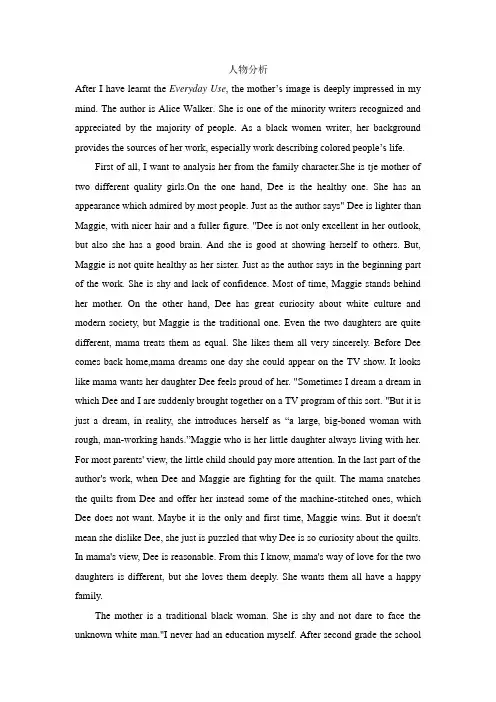
人物分析After I have learnt the Everyday Use, the mother’s image is deeply impressed in my mind. The author is Alice Walker. She is one of the minority writers recognized and appreciated by the majority of people. As a black women writer, her background provi des the sources of her work, especially work describing colored people’s life.First of all, I want to analysis her from the family character.She is tje mother of two different quality girls.On the one hand, Dee is the healthy one. She has an appearance which admired by most people. Just as the author says" Dee is lighter than Maggie, with nicer hair and a fuller figure. "Dee is not only excellent in her outlook, but also she has a good brain. And she is good at showing herself to others. But, Maggie is not quite healthy as her sister. Just as the author says in the beginning part of the work. She is shy and lack of confidence. Most of time, Maggie stands behind her mother. On the other hand, Dee has great curiosity about white culture and modern society, but Maggie is the traditional one. Even the two daughters are quite different, mama treats them as equal. She likes them all very sincerely. Before Dee comes back home,mama dreams one day she could appear on the TV show. It looks like mama wants her daughter Dee feels proud of her. "Sometimes I dream a dream in which Dee and I are suddenly brought together on a TV program of this sort. "But it is just a dream, in reality, she introduces herself as “a large, big-boned woman with rough, man-working hands.”Maggie who is her little daughter always living with her. For most parents' view, the little child should pay more attention. In the last part of the author's work, when Dee and Maggie are fighting for the quilt. The mama snatches the quilts from Dee and offer her instead some of the machine-stitched ones, which Dee does not want. Maybe it is the only and first time, Maggie wins. But it doesn't mean she dislike Dee, she just is puzzled that why Dee is so curiosity about the quilts. In mama's view, Dee is reasonable. From this I know, mama's way of love for the two daughters is different, but she loves them deeply. She wants them all have a happy family.The mother is a traditional black woman. She is shy and not dare to face the unknown white man."I never had an education myself. After second grade the schoolwas closed down. Don't ask my why: in 1927 colored asked fewer questions than they do now."Mama never has an education herself. In her words, she indicates that the black people's right has been seriously invaded. " I used to love to milk till I was hooked in the side in '49. Cows are soothing and slow and don't bother you, unless you try to milk them the wrong way."Mama's rib is been hurt very harm. But she thinks it is not the cow's fault, it's because her way of milking. She is quite kind and reasonable. "When she comes I will meet—but there they are!" Mama is so surprised and delighted to see her daughter Dee comes back home. After Dee is at home, she told mama, "Not Dee,Wangero Leewani Ka Kemanjo! "At first, I think the mama must be angry for the girl changed her name by herself. But to my astonishment, mama trys her best to call the new name. She just tells to her daughter, "Why shouldn't I? " She asked."If that's what you want us to call you,we'll call you."After I read this, I know she is a brilliant mother. She could accept Dee to use her new name Wangero, which has no “bad” history. As we all know that Dee is the symbol of the new culture. All these actions show us that she is a little bit like the white culture, or somehow, she is curious about it. From all this, we can get that the Mama in the fiction is a black woman who is protecting the Black Culture and the true meaning of black art. In Maggie and Mama’s opinion, the things which they are using everyday is the black art, and the true meaning of black art is not to show, but to use everyday use everyday.。
American short story masterpieces—passage 12 Alice Walker b. 1944 Much of Walker's inspiration for "Everyday Use" came from her own life in rural Georgia. Walker, like Maggie, grew up scarred and self-conscious: she was blinded in one eye by a BB gun at the age of eight. She also grew up poor, with a mother who made all her children's clothes, canned food in the summer, and made quilts to get through the winter Her mother had an artist's soul, and she grew flowers that were famous in three counties. "Everyday Use" substitutes quilts for flowers. Walker was once transfixed by an old quilt she saw in the Smithsonian—throwaway rag pieces sewn together into an image of Christ's crucifixion. Its author was an anonymous black woman who lived in the nineteenth century. Walker found in quilts, then, a rich and ready-made symbol representing the unrecorded tragedies and triumphs of black women like her mother
Everyday Use for your grandmamma
1. I will wait for her in the yard that Maggie and I made so clean and wavy yesterday afternoon. A yard like this is more comfortable than most people know. It is not just a yard. It is like an extended living room. When the hard clay is swept clean as a floor and the fine sand around the edges lined with tiny, irregular grooves, anyone can come and sit and look up into the elm tree and wait for the breezes that never come inside the house. 2. Maggie will be nervous until after her sister goes: she will stand hopelessly in corners, homely and ashamed of the burn scars down her arms and legs, eying her sister with a mixture of envy and awe. She thinks her sister has held life always in the palm of one hand, that "no" is a word the world never learned to say to her.
3. You've no doubt seen those TV shows where the child who has "made it" is confronted, as a surprise, by her own mother and father, tottering in weakly from backstage. (A pleasant surprise, of course: What would they do if parent and child came on the show only to curse out and insult each other?) On TV mother and child embrace and smile into each other's faces. Sometimes the mother and father weep, the child wraps them in her arms and leans across the table to tell how she would not have made it without their help. I have seen these programs. 4. Sometimes I dream a dream in which Dee and I are suddenly brought together on a TV program of this sort. Out of a dark and soft-seated limousine I am ushered into a bright room filled with many people. There I meet a smiling, gray, sporty man like Johnny Carson who shakes my hand and tells me what a fine girl I have. Then we are on the stage and Dee is embracing me with tears in her eyes. She pins on my dress a large orchid, even though she has told me once that she thinks orchids are tacky flowers. 5. In real life I am a large, big-boned woman with rough, man-working hands. In the winter I wear flannel nightgowns to bed and overalls during the day. I can kill and clean a hog as mercilessly as a man. My Lit keeps me hot in zero weather. I can work outside all day, breaking ice to get water for washing; 1 can eat pork liver cooked over the open fire minutes after it comes steaming from the hog. One winter 1 knocked a bull calf straight i.1 the brain between the eyes with a sledge hammer and had the meat hung up to chill before nightfall. American short story masterpieces—passage 12 But of course all this does not show on television. I am the way my daughter would want me to be: a hundred pounds lighter, my skin like an uncooked barley pancake. My hair glistens in the hot bright lights. Johnny Carson has much to do to keep up with my quick and witty tongue. 6. But that is a mistake. I know even before I wake up. Who ever knew a Johnson with a quick tongue? Who can even imagine me looking a strange white man in the eye? It seems to me I have talked to them always with one foot raised in flight, with my head turned in whichever way is farthest from them. Dee, though. She would always look anyone in the eye. Hesitation was no part of her nature.
7. "How do I look, Mama?" Maggie says, showing just enough of her thin body enveloped in pink skirt and red blouse for me to know she's there, almost hidden by the door. 8. "Come out into the yard," I say. 9. Have you ever seen a lame animal, perhaps a dog run over by some careless person rich enough to own a car, sidle up to someone who is ignorant enough to be kind to them? That is the way my Maggie walks. She has been like this, chin on chest, eyes on ground, feet in shuffle, ever since the fire that burned the other house to the ground. 10. Dee is lighter than Maggie, with nicer hair and a fuller figure. She's a woman now, though sometimes I forget. How long ago was it that the other house burned? Ten, twelve years? Sometimes I can still hear the flames and feel Maggie's arms sticking to me, her hair smoking and her dress falling off her in little black papery flakes. Her eyes seemed stretched open, blazed open by the flames reflected in them. And Dee. I see her standing off under the sweet gum tree she used to dig gum out of; a look of concentration on her face as she watched the last dingy gray board of the house fall in toward the red-hot brick chimney. Why don't you do a dance around the ashes? I'd wanted to ask her. She had hated the house that much. 11. I used to think she hated Maggie, too. But that was before we raised the money, the church and me, to send her to Augusta to school. She used to read to us without pity; forcing words, lies, other folks' habits, whole lives upon us two, sitting trapped and ignorant underneath her voice. She washed us in a river of make-believe, burned us with a lot of knowledge we didn't necessarily need to know. Pressed us to her with the serious way she read, to shove us away at just the moment, like dimwits, we seemed about to understand. 12. Dee wanted nice things. A yellow organdy dress to wear to her graduation from high school; black pumps to match a green suit she'd made from an old suit somebody gave me. She was determined to stare down any disaster in her efforts. Her eyelids would not flicker for minutes at a time. Often I fought off the temptation to shake her. At sixteen she had a style of her own: and knew what style was.